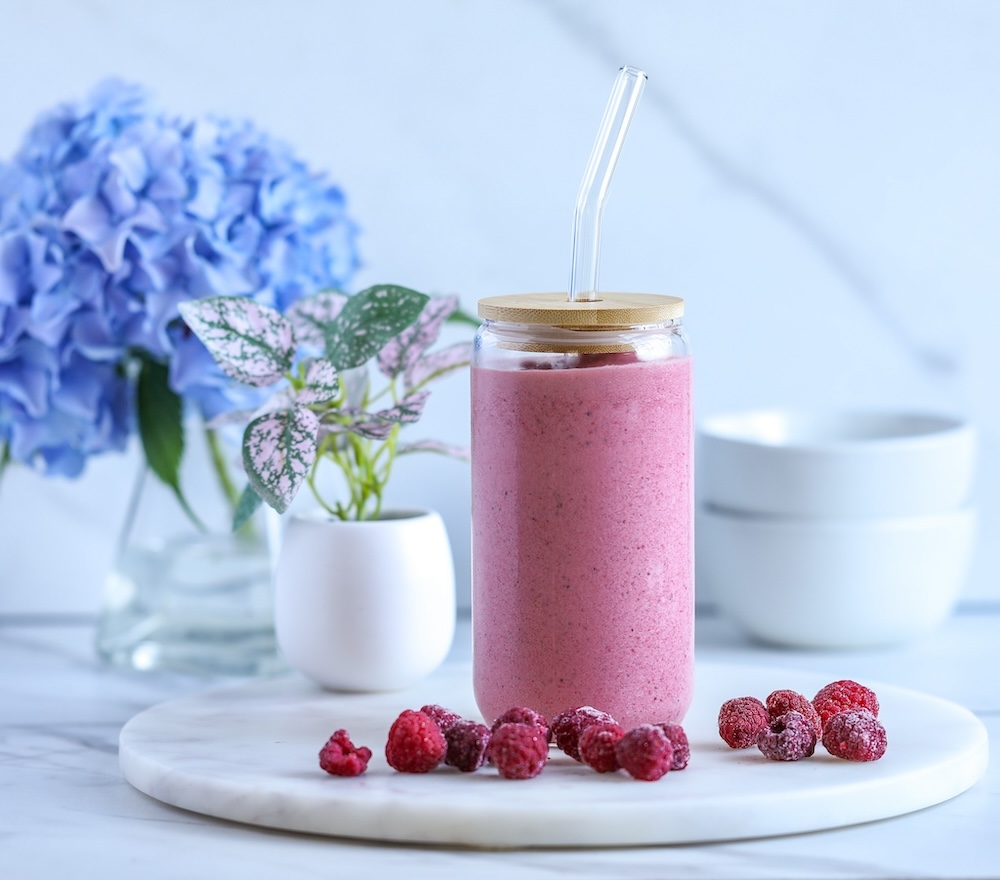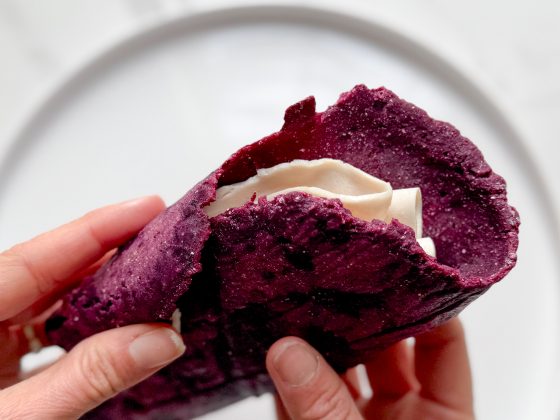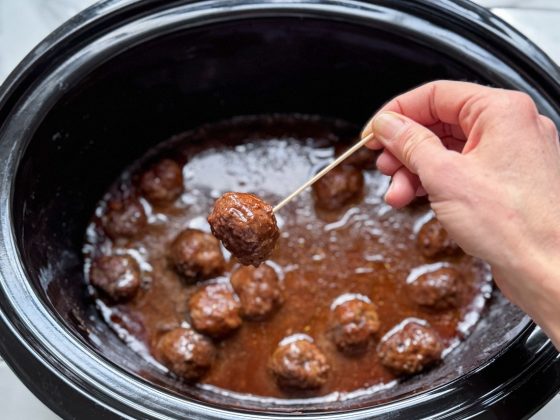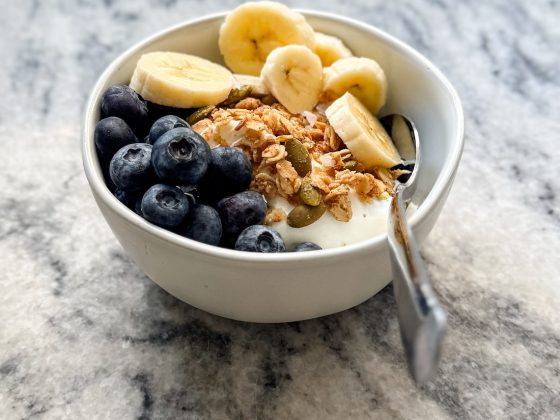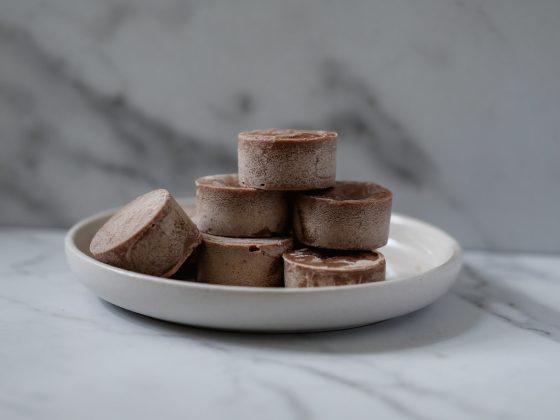I was flipping through a magazine recently, and stopped upon the prettiest picture of a bright pink smoothie. Usually when I see something like that in a magazine, I want to recreate it, so I tore out the page and posted it on my fridge (old-school style). It was days later when I looked at the ingredients, and noticed it was made with beets, alongside the promise to reduce inflammation, increase energy, and aid in post-workout recovery. I was intrigued. Having put beets in my smoothie before, I am well aware that getting the ratio right is important in order to avoid an overpowering “earthy” flavor. Mixing beets with berries is a great way to ensure this balance.
The original recipe called for Pitaya (i.e. dragon fruit), but I decided to use raspberries and strawberries instead. I have been majorly craving both throughout my pregnancy, and they lend a similar hue. Aesthetics aside, I was highly curious about the health benefits that beets can bring to a smoothie, especially since I typically drink one post-workout. Beets just so happen to be a prime example of a functional food. Not only do they make for a beautiful concoction, but most importantly, beets enhance liver health, improve digestion, support blood sugar management, encourage exercise recovery, and help prevent cancer and other forms of chronic disease.
Beets enhance liver health
One of the first things that came to my mind as I was thinking about the benefits of beets was their positive impact on liver health. I must have learned it in the past. It wasn’t until I started to dig into the science that I realized how uniquely beneficial beets are to the optimization of this important organ. Beets contain specific protective bioactive compounds that not only offer liver detoxification support while preventing liver damage and disease, but they also help to slow, thwart, or reverse any damage that has been done. The root vegetable’s antioxidant properties alone are a positive aspect of their appeal, but when you get into the nitty gritty nutrition, you will feel motivated to add them to your diet.
Beets contain a class of antioxidants called betalains, which specifically reduces inflammation in the liver, while protecting the organ from oxidative stress. Studies show that consuming beets and beetroot juice is an an effective treatment against non-alcoholic fatty liver disease. Beets also contain a compound called betaine, which helps support liver detoxification by encouraging the production of bile to digest and eliminate fats from the body. Additionally, betanin, the red pigment found in beets that contribute to their color, consists of glutathione, a powerful antioxidant known for its liver detoxifying properties.
Beets improve digestion
Not only are beets a good source of dietary fiber, but specifically insoluble fiber, which is what sets them apart for their digestive supporting powers. Insoluble fiber adds bulk to stools and encourages bowel movement, ultimately leading to a better working digestive tract. If constipation is ever something you struggle with, increasing insoluble fiber intake – and specifically consuming beets – could help. Furthermore, since consuming beets helps with elimination, this directly supports the body’s natural detoxification pathways. Another digestive bonus to beets is that their prebiotic nature feeds the good bacteria in the gut. Studies show that consuming beets and beetroot juice positively influences healthy probiotic populations, leading to a healthier digestive tract.
The digestive benefits of beets don’t stop there. Betaine, the plant-based compound mentioned above, stimulates the production of digestive enzymes, aiding in both of the breakdown and absorption of nutrients. Beets also contain essential electrolytes, which play an important role in digestive function.
Beets support blood sugar management
Two components of a food that lead to increased blood sugar control include being high in fiber with a low glycemic index, and beets check both boxes. Beets are also rich in flavonoids, plant-based compounds with powerful nutritional properties. Studies show that the unique phytochemicals found in beets offer a therapeutic effect for various diseases, diabetes being one of them. Basically when it comes to blood sugar management, beets help to improve insulin sensitivity, which in turn helps the body utilize glucose more efficiently.
Beets encourage post-workout recovery
Since I typically consume a protein smoothie post-workout, this particular benefit of beets caught my attention. Adding a beet to my smoothies is a simple baby step I can take to support my exercise recovery. Beets’ antioxidant and anti-inflammatory effects discussed thus far are relevant to workout recovery. While to what degree their consumption can help remains unknown, antioxidants have been shown to neutralize free radicals, reduce oxidative stress, and mitigate cellular damage brought on by intense exercise; anti-inflammatory properties of food can reduce exercise induced muscle soreness and facilitates faster recovery. But what is really important to note is that beets contain dietary nitrates, which lends to their functionality for athletes and active lifestyles.
Dietary nitrates convert to nitric oxide in the body, resulting in the dilation of blood vessels. This effect optimizes oxygen flow, increases muscle function, and reduces muscle fatigue. Not only does this phenomenon help with recovery, but can improve endurance in the long run. The aforementioned electrolytes also help with fluid balance and muscle repair. Electrolytes are also known to reduce muscle cramps brought on by exercise. Beets also have a high water content, which can help with hydration. Furthermore, the natural sugars found in beets help to replenish glycogen stores after exercise, which helps bring energy levels back to balance.
Beets help prevent cancer and chronic disease
Beets have been extensively studied for their anti-tumor effects, and research has shown that eating beets can help prevent cancer. The betanins found in beets are primarily responsible for their anti-tumor and anti-carcinogenic activity. Not only can consuming beets prevent cancers, but they have been historically used in various cultures around the world for both the management and treatment of cancers. Bringing it back full circle, beets are a functional food highly beneficial for human health due to everything discussed. With the prevalence of cancer and chronic disease in our modern day society, let food be thy medicine, and beets fall perfectly into this camp.
Tips for making a smoothie with beets
Thanks to the brand Love Beets, there is a short cut you can take when making a smoothie with beets. I get a package of these pre-cooked beets, then freeze in a plastic bag. I have also roasted whole beets myself, and frozen them after they completely cooled. It is also a good way to use up any cooked beets you have on hand. They don’t have to be frozen, but I highly recommend it to yield a thicker consistency.
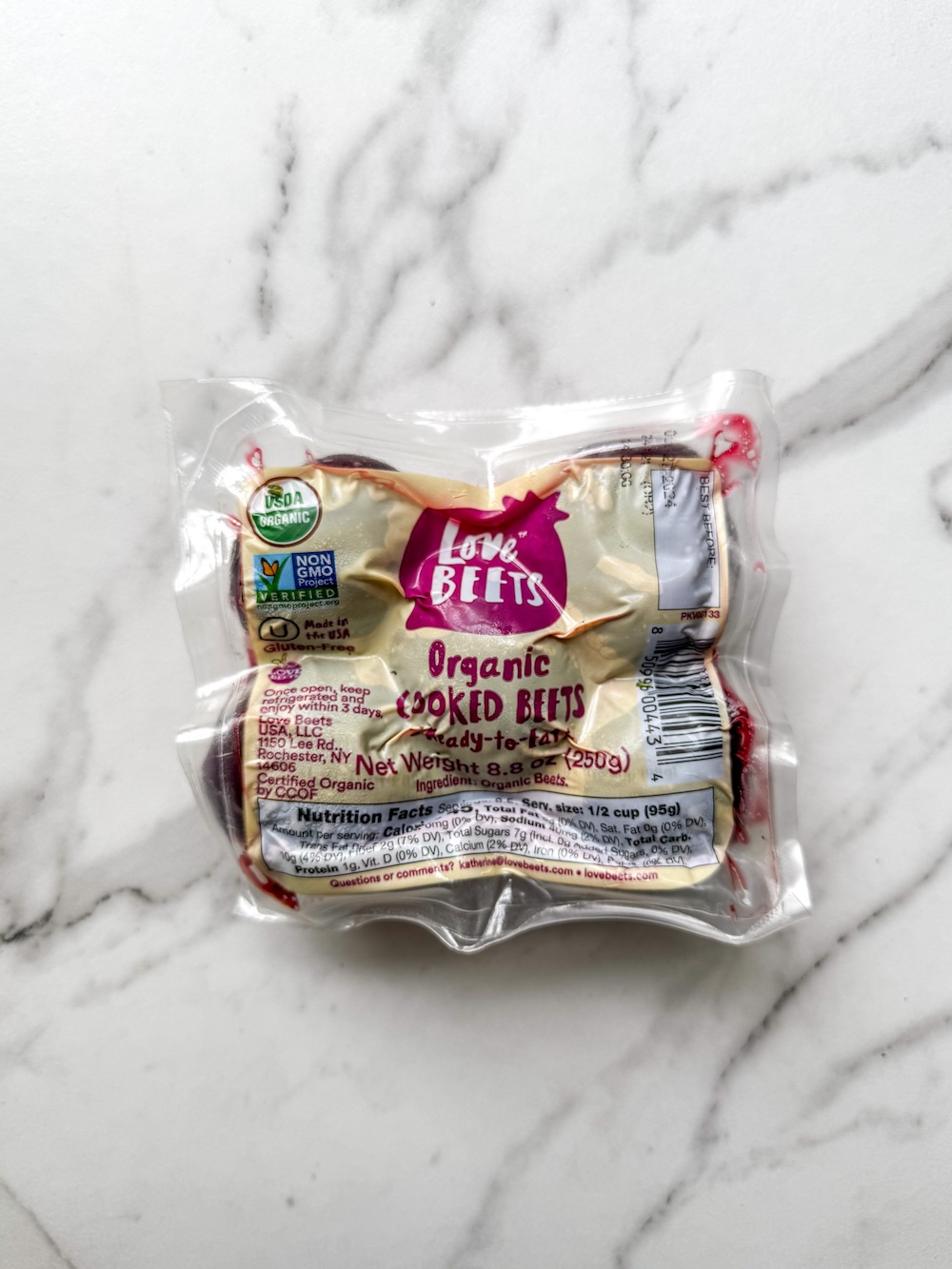
How much to add to your smoothie is dependent on the size of your beets and your flavor preferences. These Love Beets are pretty small, so I usually add a whole one. With larger beets, I will use a half per smoothie serving. Beets do have a distinct taste, so if you are someone who doesn’t really like beets, either add less, or balance with more berries.
Fruits that pair well with beets are any berries or even cherries. Oranges, apples, grapes, and kiwi also combine well with beets. Use any of these ingredients fresh or frozen to make a delicious and nutritious smoothie. When it comes to your protein powder, I find that both vanilla and chocolate work.
I will say that the first time I took a sip of my beet smoothie, I was pleasantly surprised! They have been on post-workout repeat for months, and I can’t get enough. I love it topped with my homemade granola.
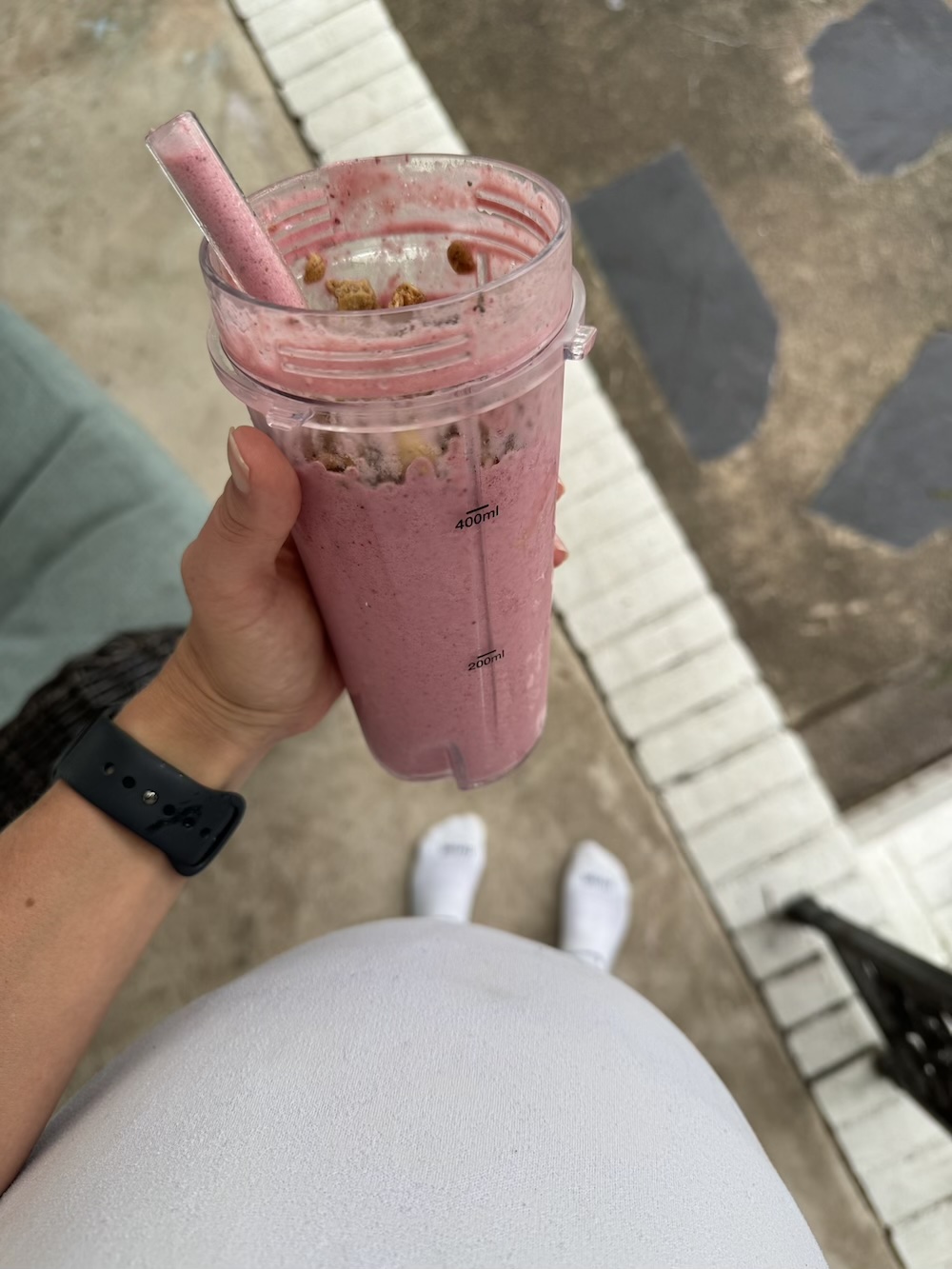
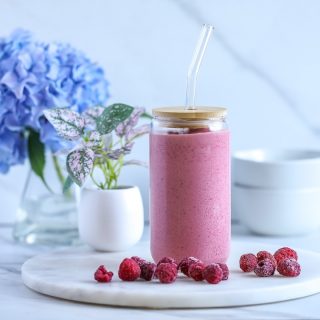
Post-Workout Beet & Berry Smoothie
Equipment
- Blender
Ingredients
- 1-2 cups dairy-free milk of choice depending on desired consistency
- 1 small frozen beet or 1/2 medium/large beet
- 1/2 cup frozen berries or cherries of choice
- 1/4 cup frozen zucchini or cauliflower rice optional; omit and add more fruit if desired
- 1 scoop vanilla or chocolate protein powder
Instructions
- Place all ingredients in a blender and process until smooth and creamy. Enjoy immediately.

